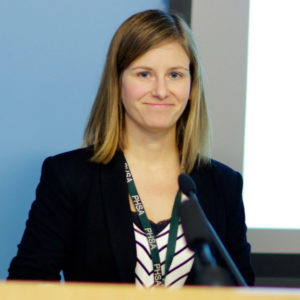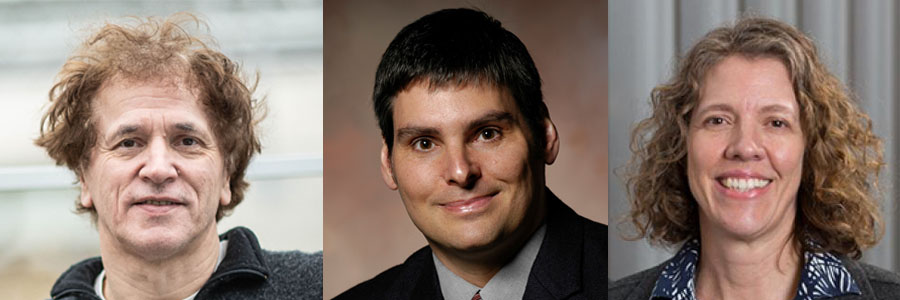UBC researchers get federal funding to help with global COVID-19 response
Yue Qian could only look on, feeling helpless, as COVID-19 ravaged her home city of Wuhan-the epicentre of an outbreak that has killed more than 3,000 people and infected more than 90,000 globally.
"When the quarantine was first issued, I was so worried," says Qian, an assistant professor in the UBC department of sociology. "I was desperately trying to connect with my family in Wuhan to make sure they were OK. Watching from afar has been really hard."
Today, Qian was announced as one of the UBC researchers-along with Dr. Richard Lester, Dr. Srinivas Murthy, Natalie Prystajecky and Dr. Mel Krajden-who are the principal investigators of teams collectively receiving more than $2.8 million in grants from the federal government to study COVID-19. The funding is focused on accelerating the development, testing, and implementation of measures to deal with the COVID-19 outbreak.

UBC sociologist Yue Qian, who is originally from Wuhan, is studying the human experiences and mental health consequences of quarantine. Credit: Paul Joseph/University of British Columbia
The federal government is providing the funding through the Canadian Institutes of Health Research (CIHR), the Natural Sciences and Engineering Research Council of Canada, the Social Sciences and Humanities Research Council, the Canada Research Coordinating Committee through the New Frontiers in Research Fund, the International Development Research Centre, and Genome Canada.
"The outbreak of COVID-19 represents a significant issue for public health in Canada and around the world," says Gail Murphy, vice-president, research and innovation at UBC. "Thanks to this generous funding from the Canadian government, UBC researchers can bring multi-faceted approaches to gaining a deeper understanding of this outbreak and help to develop treatments and prevent its spread."
'This is the least I can do to help people in my hometown'
While Yue Qian's family members have not been infected, she says some friends' family members were less fortunate, with many being hospitalized and some dying from COVID-19.
Qian and her team, which includes co-investigator and UBC sociologist Amy Hanser, are receiving $400,468 for their proposed project to study the human experiences and mental health consequences of quarantine.
"Getting this funding means a lot to me because I get to conduct research that I care deeply about," says Qian. "I feel that this is the least I can do to help people in my hometown who are suffering a lot right now."
While she is still in the process of setting up her study, Qian says she has already noticed a common theme during phone conversations with family and friends back home.
"I've learned that people are incredibly resilient and that everyone has their own way of coping when they are faced with a difficult situation," she says. "It's important for us as social scientists to be able to understand their experiences. I hope my research can contribute in this way."
Providing care to patients in isolation? There's an app for that
Dr. Richard Lester, a physician and associate professor in global health at UBC, is leading research to determine the potential for a mobile virtual health care app, called WelTel, to help people who are self-isolating to prevent transmission of COVID-19.
Lester and his team-which includes co-investigator Giuseppe Carenini, professor in the UBC department of computer science-are receiving $500,000 from CIHR to deploy the app, which has already been successfully used in Kenya helping HIV patients adhere to their antiretroviral therapy to achieve undetectable levels of the virus and prevent the spread of HIV.
"Now we have an opportunity to show how WelTel can help stop the spread of COVID-19 through supporting patients who are self-isolating at home," says Lester.
Developing clinical guidelines to treat infected patients
Dr. Srinivas Murthy, clinical associate professor in the UBC department of pediatrics and investigator and pediatrician at BC Children's Hospital, is leading a national study of hospitalized patients with confirmed COVID-19.
His team-which includes Manish Sadarangani, assistant professor in the UBC department of pediatrics and investigator at BC Children's Hospital-received $954,936 to conduct research on how best to treat the disease. The team is also working to develop formal treatment guidelines for the World Health Organization.
"It may sound rudimentary, but we still do not know who gets sick and why an individual may become sicker," he says. "It's important to gain a deeper understanding of COVID-19 in order to help infected Canadians and people around the world."
Murthy is also co-investigator on a number of other projects led by researchers across Canada who also received CIHR funding to study COVID-19.
Trying to answer the unknowns of COVID-19
A team of researchers from UBC, the BC Centre for Disease Control (BCCDC), and Simon Fraser University is receiving $1 million from CIHR, in addition to $150,000 they received last month from Genome BC.
The team-co-led by Natalie Prystajecky, clinical assistant professor in the department of pathology and laboratory medicine at UBC, and Dr. Mel Krajden, professor of pathology and laboratory medicine at UBC and medical director of the BCCDC Public Health Laboratory-is also trying to answer the many unknowns about COVID-19.
"There are many unanswered questions about COVID-19," says Prystajecky, who is also the program head for the environmental microbiology program and the molecular microbiology and genomics program at the BCCDC Public Health Laboratory. "For us, being on the frontlines of the response, it is incredibly important to try to fill in some of these knowledge gaps."
Collaboration between researchers across Canada
A number of UBC researchers are also contributing to additional COVID-19 projects across Canada that also received CIHR funding.
UBC's Josef Penninger, director of the Life Sciences Institute and Canada 150 Chair Functional Genetics, is also co-principal investigator of an international research team led by Dr. Haibo Zhang at St. Michael's Hospital in Toronto, that received $1 million from CIHR to perform a clinical trial on patients who have tested positive for COVID-19.
Francois Jean, associate professor in the UBC department of microbiology and immunology, is co-principal investigator of a project led by Dr. Richard Leduc at the Université de Sherbrooke, which received $856,000 from CIHR. Their research team is developing new anti-viral drug leads that target recently discovered host enzymes, which have contributed to the spread of a number of serious human viruses including the novel coronavirus that causes COVID-19 disease.
Julie Bettinger, associate professor in the division of infectious disease at UBC and investigator at BC Children's Hospital, is principal investigator of a project led by Dr. Scott Halperin at Dalhousie University that received $499,904. The project will examine the cultural dimensions of COVID-19, such as how individuals and community understand and react to the disease. The data will be used to improve the process by which public health policies are created and implemented.
The CIHR funding will support the researchers' work over the next two years. Research findings and data produced as a result of the funding will be shared rapidly and openly to inform the global public health response and to help save lives.











